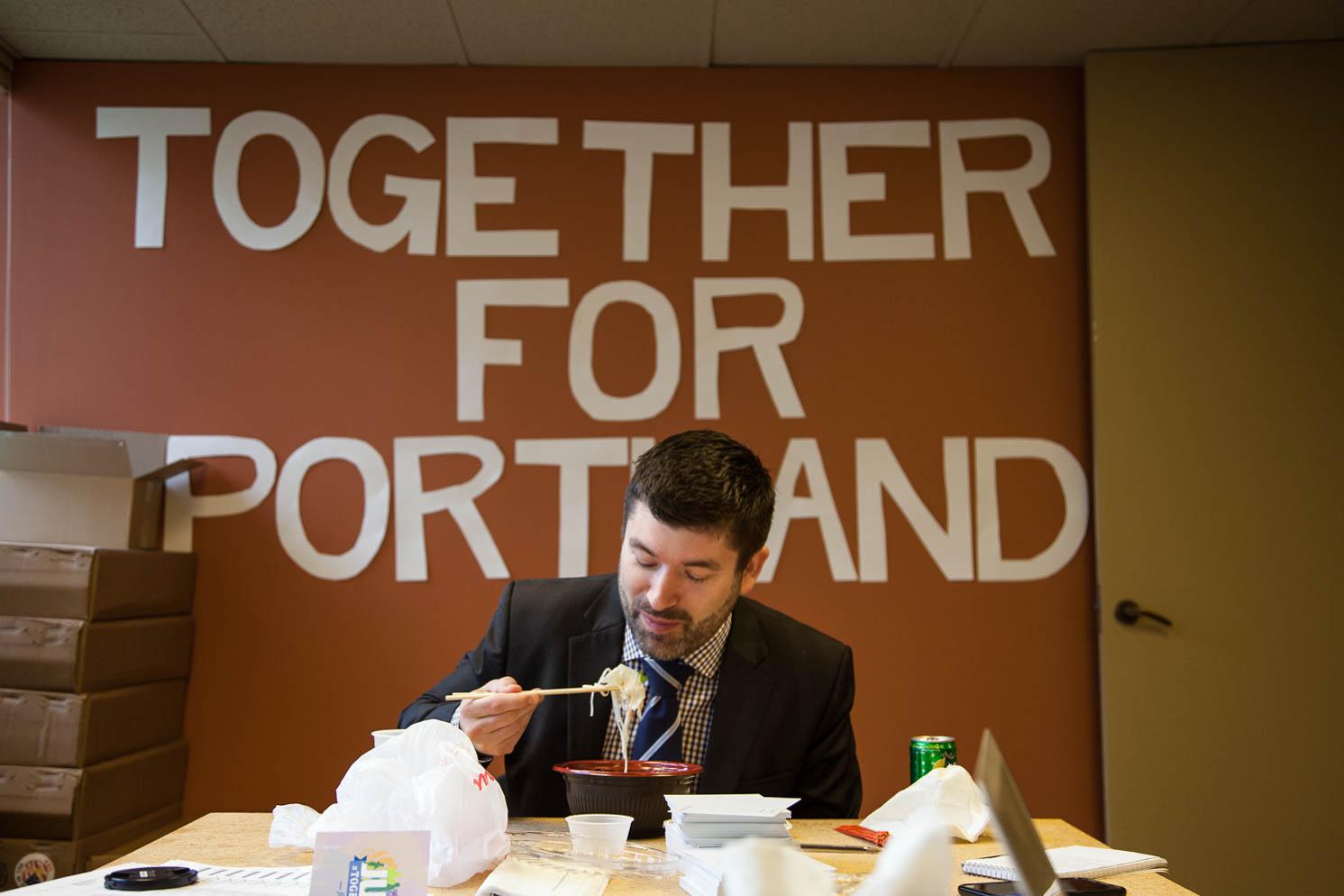
Multnomah County Commissioner and Portland mayoral candidate Jules Bailey eats lunch at his campaign headquarters.
Amelia Templeton / OPB
OPB reporters asked candidates for Portland mayor a series of questions about pressing issues facing Oregon’s largest city. Here’s a rundown on how Jules Bailey, a Multnomah County commissioner, answered.
Q&A with Jules Bailey
OPB: How would you describe the relationship between the Portland Police Bureau and the people of Portland? What steps would you take to build trust in the police?
Jules Bailey: In general, we have a community that really values the Portland police … They're concerned about safety and they want to see officers walking beats in their neighborhoods. We've shown community policing can do it in the 90s in Portland, we've seen a decline since then in our ability to do it because we have a police force that's stretched really, really thin. Long response times, and officers that have to cover a much larger area.
Related: Candidate Jules Bailey: Portland's Mayor Is Not A CEO
We need to make sure we have independent investigations of police officers when something goes wrong. We need to make sure we have body cameras so we’re getting all the right information. We need to make sure the public has the right to film police officers. And finally, we need to address and ultimately end the 48-hour rule that is protecting officers when they have to give testimony after an officer-involved shooting.
Those things alone won’t heal that divide. You have a police bureau that feels like it’s in crisis, and you have a community that feels it’s not being heard. I’ve pledged to increase staffing for the police bureau, and I’ve also pledged more reforms.
OPB: Do you agree with Mayor Charlie Hales’ decision to temporarily allow public camping in Portland? What is one step you would take to ease the homeless crisis?
JB: I think the mayor's proposal really came from a place of compassion, and I don't believe we ought to be throwing the book at people who are in crisis and on the streets … I would have done it a little differently. I think it's important to spend our energy and dollars on permitting emergency shelters in things like the ground floor of churches, church basements, the ground floors of nonprofits.
We know what works on homelessness; it’s shelter, emergency shelter, linked to mental health and addiction services with a pipeline into low-income housing. Ultimately, housing solves homelessness, and shelter provides respite. It’s an entry point. We need more entry points. Tent camping is a symptom of that larger disease.
OPB: What should city government’s role be in ensuring bike and pedestrian safety?
JB: The city obviously has an enormous role to play, but it has to do it in partnership, because we don't have enough funds to invest in all the bike and pedestrian infrastructure we need. Paint on the roads doesn't cut it. We need dedicated things like protected bike lanes and sidewalks and more infrastructure geared toward pedestrians and people in bicycles.
When I was in the legislature, I worked with Rep. Shemia Fagan to bring $10 million for sidewalk improvements to 122nd and Powell. It’s one of the most dangerous stretches of roads that we have ... The city has to be investing in infrastructure that save lives.
OPB: Are you satisfied with the work being done by the Portland Development Commission? Describe the approach you would take as mayor toward economic development and how it would differ from the PDC’s current approach.
JB: In general, yes. I think there are a lot of really good people at the Portland Development Commission who have done a lot of good work. … It's historically an urban renewal agency that's funding by tax increment financing. That source of funding is essentially going to run out. PDC is in the process of figuring out what's the next step for PDC? Does it continue to exist? If it does, where does the revenue come from? Is it going to be a form of urban renewal? Is it real estate? Is it parking? As we navigate that transition, there's an opportunity to do some restructuring, some rebranding and really call out things like a separate element for small business assistance.
OPB: Name one distinct neighborhood or area of Portland that needs more attention from city government, and why.
JB: You could pick a lot of different areas east of 82nd and east of I-205 that need a lot of help. But the good news is that there have been successes in areas that have been underserved … We have, finally, the New Copper Penny in Lents Town Center that is going to be converted into affordable housing and commercial space. That's a great opportunity and shows what consistent investment and sticking to the plan can get you. We need to have that's same kind of commitment to places in Rosewood and other places in Portland that historically have had significant underinvestment.
An area for me that is always front in center in my mind, growing up one of my best friends lived on 141st and Division … That area has seen so much change. David Douglas has 76 languages spoken. It’s the largest high school in Oregon. It is an area that has so much opportunity. But there’s poor transit access, not a lot of great sidewalks, the infrastructure doesn’t work, and even there the housing prices are starting to go through the roof. We need a more consistent focus on that area.
